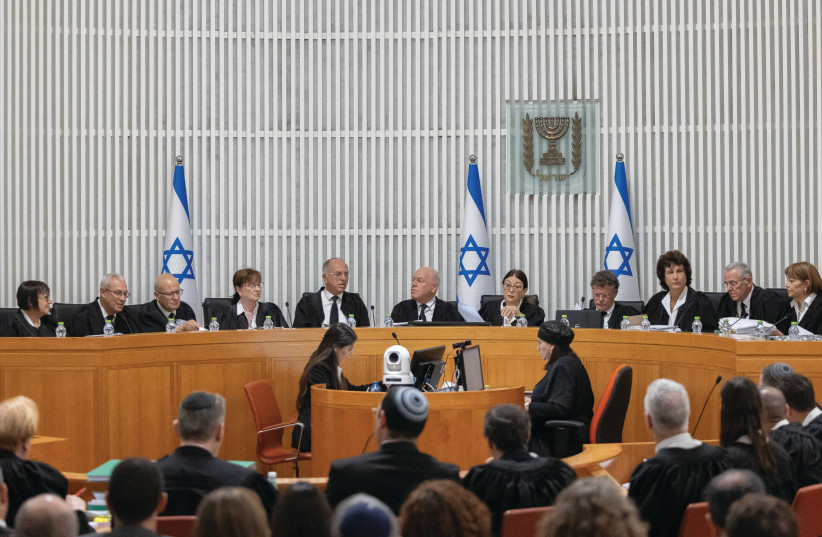
On January 4, 2023, Israel’s newly appointed Justice Minister Yariv Levin opened a Pandora’s box with his plan aimed at “strengthening democracy, restoring confidence in the justice system, and rebalancing the three branches of government.”
This was the main source of social unrest throughout 2023, sending hundreds of thousands to Israel’s streets in protest for weeks. Tensions between supporters and opponents of the plan intensified national divisions, raising the specter of a civil war.
Until October 7 happened.
In the initial phases of the Gaza war, it seemed that the legal reform had been sidelined. However, the Supreme Court’s recent overturning of the controversial reasonableness standard law – a central pillar of Levin’s reform – reignited public discourse on this issue. Still, post-October 7, Israel's landscape has transformed. The nation cannot afford to revert to past rifts or endure ongoing strife. Israel's new reality calls for deep reflection: What should the “day after” the ruling entail? Has the war with Gaza reshaped our perspective on Israel’s future and its democracy?
How will Israel's "day after" Gaza reshape democracy?
In recent weeks and months, Israeli political discourse has centered on assigning blame for the tragedy of October 7, neglecting the deeper systemic issues at stake. The court's ruling should trigger a shift toward a discussion to address these fundamental flaws of governance. Rectification of these failures is essential. Urgent, strategic, and fundamental interventions are imperative to strengthen and streamline the governing mechanisms, ensuring their efficacy during times of crisis.

TO KICKSTART this necessary transformation, reevaluating the Knesset's role within Israeli democracy is essential.
The court's ruling emphasizes the pivotal role of a robust, independent, and effective legislative body, particularly in matters concerning national security and social welfare. This shift must start by restructuring the legislative process and related procedures in Israel and clarifying the powers of the legislative body.
Simultaneously, planning for the “day after” requires a transformation to establish stringent oversight mechanisms for the effective implementation of much-needed reforms by governmental bodies. Strengthening Knesset committees and their oversight tools and the refocusing of deliberations and legislative processes toward the needs of the public must transcend political posturing and party-based animosities.
Turning to the executive branch, the court’s ruling also emphasized the need for reform, specifically highlighting the adverse effects of governmental instability on inter-ministerial cooperation and the discord among national and local authorities.
In the immediate aftermath of the massacre, Israelis were left stranded for hours without rescue and with inadequate ambulance support or evacuation options. Weeks on, government support for shelter, healthcare, education, mental health, and business assistance remains thin. The nation’s resilience, heavily reliant on this support, is being tested by the lack of a robust civil-state infrastructure.
The High Court’s ruling calls for a prompt and profound reevaluation of the Israeli government’s operational mechanisms. Prolonged political crises have inflated budgets, revised authorities, and redistributed responsibilities, prioritizing political expediency over national imperatives. Addressing these structural weaknesses necessitates coordinated action to stabilize the government structure and branches while establishing clear inter-agency guidelines and local authority protocols.
Such reforms aim to remedy persistent flaws within Israel's executive branch and enhance Israel’s crisis management capabilities, which have become increasingly apparent in recent months.
The recent ruling also reflects a dire need for the judiciary to reclaim its fundamental role in our democracy. As the courts have become the primary arbiters in public disputes – a trend peaking in 2023 with the government's promotion of the legal reform – the High Court’s annulment of the controversial reasonableness standard law has reignited public discussion on this matter.
Post-October 7, and to prevent its recurrence, Israel's leadership should strive to build a strong consensus on the remit of each government branch. A Basic Law of legislation is a good initial step. However, it is equally essential to explore alternative public dispute resolution methods. Doing so is crucial in reinstating confidence in the judiciary as a facilitator of societal balance rather than a perpetuator of prolonged conflicts.
For Israeli democracy, the imperative for change cannot be understated. Facing these complex challenges, it falls upon our elected representatives to steer conversations away from the endless cycle of blame and recriminations fueled by media platforms. Instead, a pivot toward substantive dialogue concerning the country's foundational issues and their resolution is vital for progress and societal cohesion.
In parallel, we, the Israeli public, must also shift our mindset.
For many, support for a party or a leader meant supporting all its positions on all issues. This is no longer viable. The war in Gaza has proven that our enemies, regardless of our political or religious beliefs, or even our ethnicity, view us as one homogeneous target.
Hamas and its allies interpret our societal divisions as disintegration and a source of vulnerability. Here, they are mistaken. Rather, the diversity and vibrancy of Israeli society are its sources of strength.
Our true victory lies in understanding that unity does not require uniformity. It is our shared goal to rebuild our nation and mend the wounds from the tragedy we experienced.
The ruling of the High Court presents an opportunity to reimagine, reengineer, and reform Israel’s governance and institutional framework. Implementing reforms, establishing robust checks and balances, and fostering a culture of transparency and accountability are crucial to bolster the nation’s preparedness and resilience in the face of future challenges.
Our “day after” begins now.
The writer is program director at Tachlith – The Institute for Israeli Policy.
